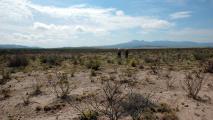Activists, scientists, and members of the Micmac Nation are working together to rid some of the indigenous tribe’s land of toxic “forever chemicals” — by having hemp plants pull them straight from the soil.
Forever chemicals: “Forever chemicals” is a term used to describe a class of human-made chemicals called PFAS (per- and polyfluoroalkyl substances).
These chemicals have been used in commercial products since the 1940s, and today, they can be found in everything from cosmetics to cookware.
Their nickname comes from the fact that the chemicals can take thousands of years to degrade, so once they’re in the environment, they’re there “forever.”
The challenge: The ubiquity of products containing PFAS and their long lifespan has led to a situation where the chemicals are now everywhere: they’re in our soil, drinking water, and even our bodies.
This is a problem because forever chemicals can be toxic to humans at some levels, and have been associated with health issues ranging from fertility problems to cancer.
The land: In 2018, the Aroostook band of the Micmac Nation reclaimed 800 acres of land in Maine from the U.S. government. Included in this land was part of the Loring Air Force Base, which had previously been used to train firefighters.
“The part that we received was supposed to have been cleaned.”
Richard J. Silliboy
Firefighting foam contains PFAS, and an inspection conducted by the U.S. Air Force in 2018 found “concerning levels” of forever chemicals in groundwater at the site.
“The part that we received was supposed to have been cleaned, but there’s still a lot of ground there that I believe is contaminated,” Micmac Nation member Richard J. Silliboy said in a newly published commentary on the clean-up effort. “We need to study that before we can plan to use the property.”
In 2019, the tribe began working with environmental cleanup organization Upland Grassroots and scientists from the Connecticut Agricultural Experiment Station to analyze the land and see what could be done to decontaminate it.
Phytoremediation: Most proven methods for removing forever chemicals from soil are expensive and energy intensive, so the group decided to try a technique called phytoremediation instead.
During phytoremediation, crops are planted on a contaminated site. When the plants then pull water and nutrients from the soil, they also extract the contaminants.
“How do we fix this problem? Can we help make it a productive habitat again?”
Chief E. Peter Paul
The technique has been used to extract chemicals from the ground at bomb ranges and to pull heavy metal pollution from the soil around old mines.
For the Loring project, the researchers decided to plant hemp because it grows fast and pulls in a lot of water. Previous studies had shown hemp could extract toxic metals from soil, but its ability to remove PFAS was untested.
The story so far: The project is ongoing and findings have yet to be peer-reviewed, but the team claims the plots where they planted the hemp showed decreased concentrations of the primary forever chemical detected at the site (PFOS).
More research is needed to figure out whether phytoremediation could extract enough forever chemicals to make the land useful again, but Chief E. Peter Paul of the Micmac Nation is excited by the possibility.
“This is just the beginning,” he said in the commentary. “We’re in the beginning stages of learning what can be done with this land that the United States has not been wanting to deal with for one reason or another.”
“How do we fix this problem?” he continued. “What other chemicals can hemp extract from the ground? Can we help make it a productive habitat again?”
We’d love to hear from you! If you have a comment about this article or if you have a tip for a future Freethink story, please email us at [email protected].






